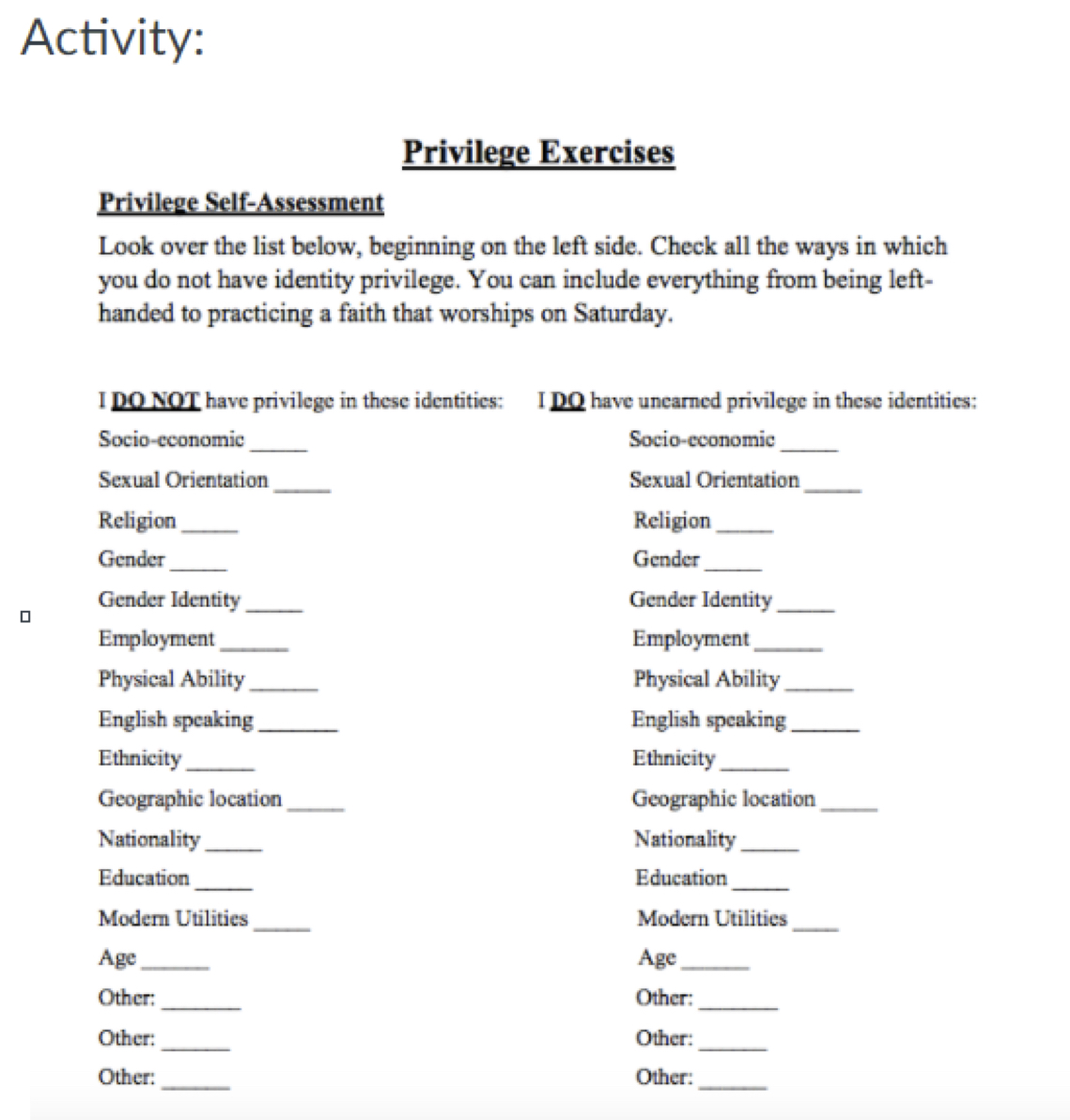- A Charlotte-Mecklenburg Schools teacher was told to have middle-school students complete a “Privilege Self-Assessment”
- It isn’t the first time a North Carolina public school has tried to make students confess their identity “privileges”
- Not only are such assignments outside of state standards, but also they may well violate a 1978 law that requires parental consent to collect personal information from families
Last week, a Charlotte-Mecklenburg Schools teacher (who requested anonymity because they fear retaliation by school administrators) reached out to a colleague about a troubling worksheet the teacher was requested to assign to middle-school students.
The teacher forwarded a copy of the “Privilege Self-Assessment” worksheet below, which appeared to originate from the University of Central Arkansas Office of University Training. The worksheet included a link to “How To Talk About Privilege To Someone Who Doesn’t Know What That Is” from EverydayFeminism.com.

Unless the teacher is perpetrating a hoax, no one should be surprised to hear about the use of these activities in Charlotte Mecklenburg Schools (CMS). In a controversial “welcome back” video posted in August 2020, CMS superintendent Earnest Winston outlined his commitment to combating systemic inequality and championing social justice measures that, he claims, will narrow disparities across racial, ethnic, and socioeconomic groups.
Part of that effort included a focus on identity. Winston told teachers that “it is important to be clear about your own personal beliefs, bias, and how they show up in your relationships with students.” The Privilege Self-Assessment would appear to be an extension of those efforts. As of the publication of this article, CMS officials have not responded to a request for comment or verification of the teacher’s claim.
A Wake County high school’s “diversity inventory”
It would not be the first time a North Carolina public school asked students to confess their privilege in a worksheet. In August 2019, an English teacher at Heritage High School in Wake County distributed a “diversity inventory” to tenth-grade students. The assignment asked students to indicate their religion, race/ethnicity, ability, sexual orientation, country of origin, age, socioeconomic status, and gender. Once the students recorded their answers, the teacher required students to answer a series of probing questions about themselves.
Wake County parent Dina Bartus courageously posted an image of the assignment on social media and lodged a complaint with the school and district. Dozens of local and national news outlets covered the controversy. The Wake County school system quickly distanced itself from the assignment.
“The Diversity Inventory worksheet in question is not a district-provided resource,” said the Wake County Public School System (WCPSS) in a statement. Melissa Wilson, the teacher responsible for the assignment, was docked a week of pay. According to the Heritage High School website, Wilson still teaches at the school.
We don’t know if other teachers at Heritage High School or elsewhere in Wake County required students to complete similar worksheets. But we do know that the Diversity Inventory assignment was not aligned with North Carolina’s 10th grade English language arts standards.
So who allowed the teacher to assign a worksheet that was inconsistent with state standards? It is more common than you think. State standards provide a general outline of topics and themes that teachers are expected to cover during the school year. For better or worse, the state grants schools and teachers an extraordinary amount of autonomy regarding curriculum matters. The lack of standardization is one reason we know little about the content taught in individual classrooms.
Not only was the Heritage assignment educationally suspect, but it also likely violated federal law. A couple of months after the story broke, Wake County parent Evan Bundros submitted a complaint to the Student Privacy Office at the U.S. Department of Education. He argued that the Diversity Inventory assignment violated the Protection of Pupil Rights Amendment (PPRA), a 1978 law that requires parental consent to collect personal information from families.
In a letter dated January 15, 2021, department officials declared that there was reasonable cause to proceed with the investigation. The agency requires the Wake County school superintendent, Cathy Moore, to submit a written response to agency officials by February 12. Given the overwhelming evidence that Bundros submitted, I believe that WCPSS will have no choice but to admit to wrongdoing.
CMS may claim that the Privilege Self-Assessment does not violate PPRA because it does not ask students to write down their religion, political affiliation, or sexuality. After the Diversity Inventory controversy hit the airwaves, Wake County administrators distributed a memo discouraging teachers from asking students to “reveal information about their identity or other sensitive, personal information.” Do checkmarks on a list also cross the line? Even if they don’t, the use of the Privilege Self-Assessment in Mecklenburg County suggests that the controversy over the Diversity Inventory did not deter the continued infiltration of identity politics in our public schools.
Students are suffering from unimaginable learning loss thanks to the COVID-19 pandemic. We don’t have time to waste on woke.
Families have a right to demand that educators deliver a rigorous, standards-aligned curriculum. If their assigned schools fail to do so, parents should have access to alternatives for their children.

